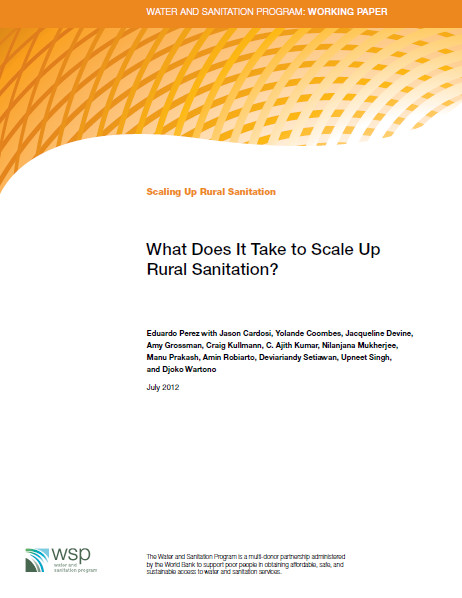What does it take to scale up rural sanitation?
 |
Comment accélérer le développement de l’assainissement rural ?
rapport Jun 2012 ; 58 pages
Aut.
Ed. WSP - Washington
Téléchargeable sous format: PdF
Téléchargeable chez l'éditeur
Abstract:
The paper shares lessons and best practices learned from this work, specifically in:
- generating demand for sanitation at the household and community levels;
- increasing the supply of affordable, aspirational sanitation products and services; and
- strengthening local and national governments to lead large-scale sanitation programs.
Key components are introduced and illustrated with examples from the field, including an overview to programmatic approaches that have been combined and tested to create demand, change behaviors, and improve supply chains:
- Community-Led Total Sanitation
- Behavior Change Communication
- Sanitation Marketing
The Working Paper also introduces various financing strategies that were used to accelerate access to improved sanitation—from offering incentives to communities to achieve open defecation free (ODF) status, to helping local masons access molds and raw materials, to developing or strengthening business networks to link masons with local hardware stores.
Implementing a programmatic approach at scale requires an effective and sustainable service delivery model in which all stakeholders—national, state, and local governments, communities, the local private sector, and development partners—play a role. For example, national and state governments can support systematic policy and sector reforms and thus provide a strong supportive enabling environment, while local governments can lead promotion activities and provide ongoing monitoring and evaluation, and the local private sector can produce reliable and affordable materials at a pace that meets demand.
Lessons and insights from the program reinforced the assumption that local governments must play a central role in the implementation . Although they may lack capacity in some areas, local governments are the only structure in the country with the legal mandate, staff, and physical infrastructure to implement large-scale rural sanitation programs.
Mots clefs: |
assainissement (CI) (DT) (OP) (ope) , ATPC Assainissement Total Piloté par la Communauté (CI) (DT) (OP) (ope) , rural (CI) (DT) (OP) (ope) |
Editeur/Diffuseur: |
|
WSP
-
Water and Sanitation Program - Washington - Etats Unis |
En cas de lien brisé, nous le mentionner à communication@pseau.org